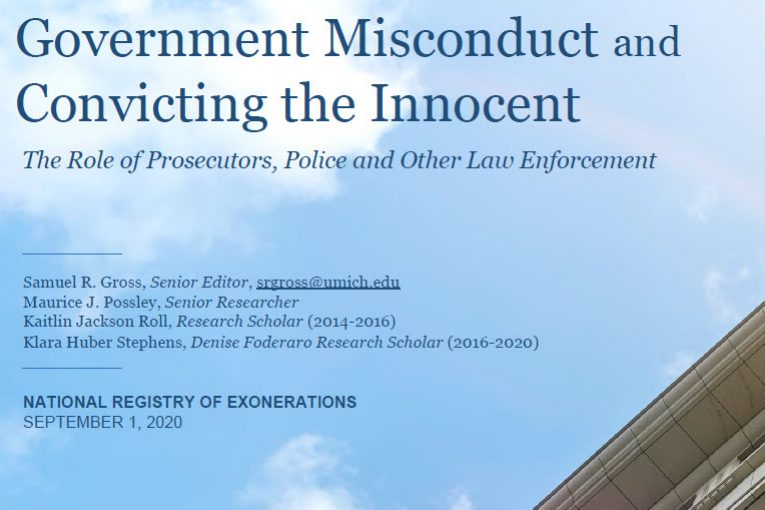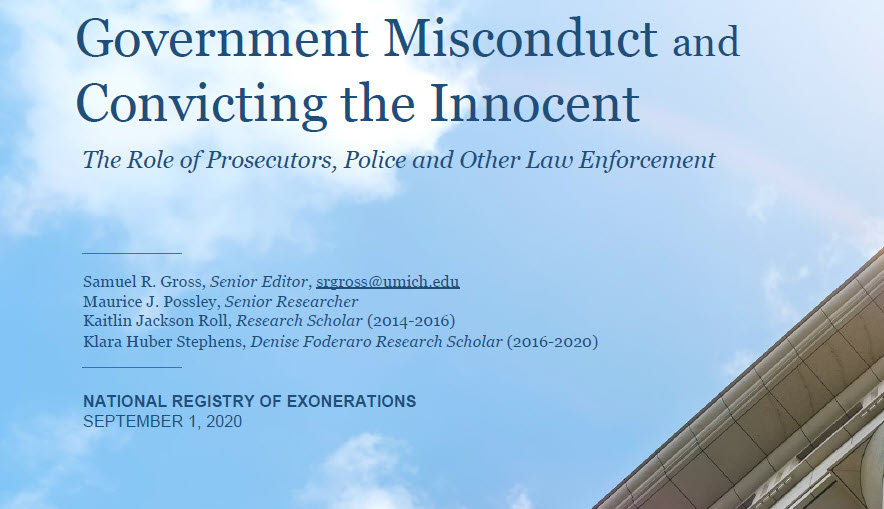

(This is the ninth of an 11-part series by The Vanguard reporting on a study of exonerations produced by Samuel R. Gross, Maurice J. Possley, Kaitlyn J. Roll, and Klara H. Stephens)
By: Layla Mustafa
Federal cases represent a minority of criminal prosecutions in the United States – research done on federal cases indicate systemic differences between federal and state court systems according to a report written by Samuel R. Gross, Maurice J. Possley, Kaitlyn J. Roll, and Klara H. Stephens.
Five percent of the exonerations studied by Gross et. al. were convictions for federal crimes.
One of the most prominent distinctions between state and federal courts is the difference in violent convictions.
There are far fewer federal convictions for violent cases than there are for state convictions. In federal courts, white-collar crimes account for a much higher percentage of convictions, ranking at 16 percent of federal convictions and 41 percent of federal exonerations.
In this sense, white-collar crimes mimic what murder crimes are to state courts — high in exonerations and rife with misconduct.
The largest concentration of federal exonerations is among white-collar crimes and the overwhelming majority of misconduct associated with these cases are executed by prosecutors rather than police officers, according to Samuel R. Gross, Maurice J. Possley, Kaitlyn J. Roll, and Klara H. Stephens.
The most obvious discrepancy between white-collar crime exonerees and murder exonerees are the subsequent jail time. White-collar crimes result in much lighter sentences than murder crimes, and also tend to include expedited exonerations. The average time for an exoneree convicted of murder to be exonerated was 14 years, while the average time for white-collar crime exonerees to be released was three years.
In other respects, murder crimes in state courts and white-collar crimes in federal courts share some similarities.
First, they are both the most common type of exoneration within their respected court. Second, they are cases which typically carry much more weight among the public. They both tend to be “expensive, long running, and conspicuous.” Commonly expensive and highly publicized cases are likely to face misconduct and misconduct is thus more likely to be discovered, said researchers.
In the case of U.S. Senator Ted Stevens, he was indicted in D.C. for failing to report gifts totaling about $250,000 dollars. There had been much rumor and speculation prior to the indictment on the private dealings of Stevens, however in this specific case, he was not guilty of the allegations made against him.
The prosecution, believing his guilt but lacking proper evidence to indict Stevens engaged in an assortment of misconduct and concealed evidence. The conviction resulted in Stevens losing his electoral race as well as much public support. The subsequent exoneration then resulted in the public condemnation of the prosecutorial team, and very unfortunately for one of the prosecutors — a suicide.
In state courts misconduct is slightly more prevalent among law enforcement officials than with prosecutors. In federal courts, prosecutors commit misconduct more than two and a half times as much as police officers. This gap widens even more when observing specifically white-collar exonerations.
Prosecutors committed misconduct seven times the amount of law enforcement in white-collar exoneration cases.
In state courts, prosecutors are generally not made aware of a crime until a police officer requests the prosecutor to charge a defendant who has already been identified, arrested, and possibly interrogated.
Samuel R. Gross, Maurice J. Possley, Kaitlyn J. Roll, and Klara H. Stephens said, for federal prosecutors, nearly two-thirds of the cases included federal law enforcement agencies. Multiple cases then illustrated the significant role federal prosecutors had in the investigations or initiation of investigations for white-collar crimes within these agencies.
It is most common for prosecutors to be involved in the concealment of exculpatory evidence, the study determined.
It is solely the role of the prosecutors to fully disclose exculpatory evidence to the court, not the duty of the police officer. Cases in which the prosecutor was never made aware of particular evidence are referred to as “concealed evidence” but do not fall under the same category.
In federal white-collar crime cases the first 1,361 exonerations in the Registry show that in all cases where evidence was concealed, the prosecution was responsible for withholding exculpatory evidence.
In handling witnesses to federal cases, prosecutors also played a major role. Witness tampering made up 17 percent of federal white-collar exonerations, and all misconduct was committed by prosecutors.
In 26 percent of federal white-collar exonerations, prosecutors knowingly allowed witnesses to commit perjury. This is almost at twice the rate which prosecutors allow for witness perjury in state murder exonerations.
The evidence and trials reviewed from the federal court suggest some kind of prosecutorial “domination” over official misconduct. The researchers attempted to provide some reasoning for this observation. Similar to the trend of official misconduct in murder exonerations, officials are motivated to prosecute serious crimes that are difficult to prove.
Both federal white-collar cases and state murder cases tend to receive a lot of public attention that may result in the advancement or demise of a professional career. Ultimately, this pressure leads to many forms of official misconduct in trying to prove the accused’s guilt.
Despite federal cases representing a smaller portion of criminal prosecutions in the country, they give necessary insight into misconduct at the federal level.
Through their research, Gross et. al. were able to pinpoint a startlingly high correlation between federal cases and white-collar crime exonerations, as well as federal cases and prosecutorial misconduct.
To sign up for our new newsletter – Everyday Injustice – https://tinyurl.com/yyultcf9
Support our work – to become a sustaining at $5 – $10- $25 per month hit the link:





